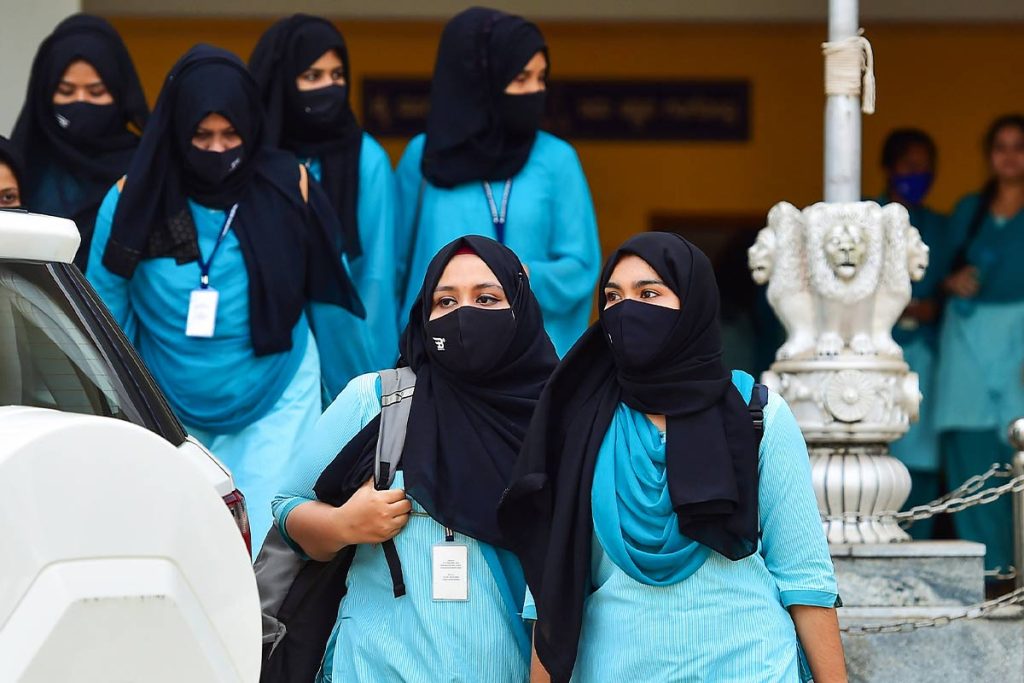The crucial element is the non-negotiable right of a child to education and there is no need to get drawn into endless debates about politically charged discourses.
In Karnataka, a piece of cloth, the hijab, has become the hot spot of religious, political, educational and cultural turmoil. While most arguments for or against have almost been exhausted, I would like to look at the hijab from the lens of the director of a premier law college in Bengaluru.
First of all, the location of the hijab issue is crucial. If it was a standalone issue, it would not have generated so much attention and angst. The issue has to necessarily be viewed in a larger context of extreme targeting of Muslim (and other minority) communities by a religious fundamentalist narrative that sees zero room for diversity, secularism, plurality or inclusiveness. In this narrative, one has to either project oneself as a (aggressive) Hindu or submissively accept any kind of indignity and discrimination as a non-Hindu. In this framework, the defiant, hijab sporting woman is viewed as a threat because she wears the hijab proudly, uncompromisingly and unapologetically.
Secondly, the hijab issue brings to focus a central question before all government, privately run or minority educational institutions. What is the role of the uniform in educational institutions? Here, I have a clear position. Educational institutions should either practice a clear policy that uniforms have to be worn by all (leaving religious markers at the gate of the school or college, preferably at home) or that every and any religious marker be allowed into the institution.
The first option means that no student, irrespective of whether they are from a religion backed by political bigwigs or not, is allowed to wear any symbol of any religious significance – no turban, no facial hair, no sindoor, no bangles, no cross/rosary, no hijab etc.
In the second option, every and any marker is allowed as long as there is reasonable proof that it is essential religious practice of the wearer of the marker. In the current Indian context, this brings in an important, but crucial point to be thought through, especially by those from the minority community. In a country where Hindu religious markers like bindi, bangles, pujas, photos of Hindu deities, lighting of the lamp, flowers etc. are normalised and practised routinely, the counter to any assertion by a minority religion is labelled as (ab)normal triggering an aggressive, hyper-masculine Hindutva assertion. In essence, most schools and colleges will be saffronised, not just of students but of faculty as well. Is this a consequence that the minority community is prepared and equipped to handle?
For me, the crucial element is the non-negotiable right of a child to education. If a child were to approach me saying that (s)he would not allowed by her religious diktats, to access education, if she refuses to wear a religious symbol, then, given the dire need for education in the country, I may be willing to stretch the scope of what a uniform entails. Essentially, if, as the director of an educational institution, I had to make a choice between allowing a religious symbol without which a child of the country would be denied an education, I would choose education, especially of a girl child, over and above any other consideration. Considering the concerning state of education in the country, I would urge all other principals, education boards, courts and civil society to make a similar choice.
What we need to understand as educators is that we cannot become pawns in a political game and need not get drawn into endless debates about politically charged discourses. I spoke to some of the Muslim girl students in my college two days ago. They had a variety of opinions, sometimes contradictory, sometimes uncertain, but it was clear that they wanted to study at all costs. That, and that they felt safe to that in our college. At the end of the day, that is all that those of us who manage educational institutions need to ensure that children feel that they have safe spaces to study and reach their best potential.
The author is the Director, St Joseph’s College of Law (SJCL) in Bengaluru. Views expressed are the author’s own.
(Note: This is an unedited and auto-generated story from Syndicated News feed. PriyaSaha.Com Staff may not have modified or edited the content body. Please visit the Source Website that deserves the credit and responsibility for creating this content.)

